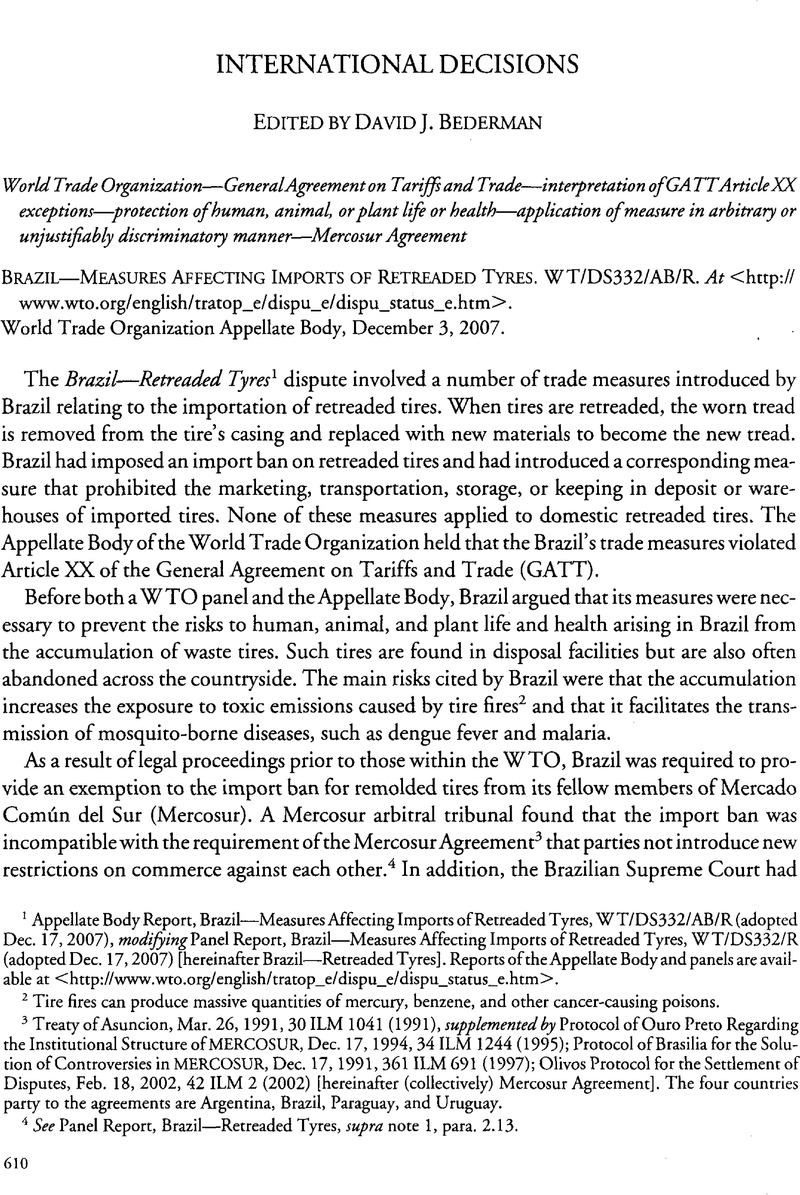Published online by Cambridge University Press: 27 February 2017

The opinions expressed in this case report are those of the author and in no way represent those of the Government of Canada
1 Appellate Body Report, Brazil—Measures Affecting Imports of Retreaded Tyres, W T/DS332/AB/R (adopted Dec. 17,2007), modifying Panel Report, Brazil—Measures Affecting Imports of Retreaded Tyres, WT/DS332/R (adopted Dec. 17,2007) [hereinafter Brazil—Retreaded Tyres]. Reports of the Appellate Body and panels are available at <http://www.wto.org/english/tratop_e/dispu_e/dispu_status_e.htm>.
2 Tire fires can produce massive quantities of mercury, benzene, and other cancer-causing poisons.
3 Treaty of Asuncion, Mar. 26, 1991, 30ILM 1041 (1991), supplemented by Protocol of Ouro Preto Regarding the Institutional Structure of MERCOSUR, Dec. 17,1994,34 ILM 1244 (1995); Protocol of Brasilia for the Solution of Controversies in MERCOSUR, Dec. 17, 1991,361 ILM 691 (1997); Olivos Protocol for the Settlement of Disputes, Feb. 18, 2002, 42 ILM 2 (2002) [hereinafter (collectively) Mercosur Agreement]. The four countries party to the agreements are Argentina, Brazil, Paraguay, and Uruguay.
4 See Panel Report, Brazil—Retreaded Tyres, supra note 1, para. 2.13.
5 Id., paras. 7.287–.289,7.350–.355. The panel did find, however, that by allowing the importation of used tires pursuant to the court injunctions in Brazil, Brazil had applied the import prohibition in a manner that constituted “unjustifiable discrimination” and a “disguised restriction on trade”; the amount of used-tire imports taking place under the court injunctions significantly undermined the stated objective of the import ban. Id., paras. 7.306, 7.347–349.
6 Panel Report, European Communities—Measures Affecting the Approval and Marketing of Biotech Products, WT/DS292/R (adopted Nov. 21, 2006); Appellate Body Report, European Communities—Measures Affecting the Prohibition of Asbestos and Asbestos-Containing Products, WT/DS135/AB/R (adopted Apr. 5, 2001). The EC—Asbestos dispute did not involve an environmental measure but a measure necessary for the protection of public health.
7 Appellate Body Report, United States—Standards for Reformulated and Conventional Gasoline, WT/DS2/ AB/R (adopted May 20, 1996) [hereinafter U.S.—Gasoline]; Appellate Body Report, United States—Import Prohibition of Certain Shrimp and Shrimp Products, WT/DS58/AB/R (adopted Nov. 6, 1998) [hereinafter U.S.—Shrimp]; Appellate Body Report, United States—Import Prohibition of Certain Shrimp and Shrimp Products, Recourse to Article 21.5 of the DSU by Malaysia, WT/DS58/AB/RW (adopted Nov. 21, 2001).
8 Appellate Body Report, U.S.—Shrimp, supra note 7, paras. 161–63.
9 Appellate Body Report, United States—Measures Affecting the Cross-border Supply of Gambling and Betting Services, para. 308, WT/DS285/AB/R (adopted Apr. 20, 2005) [hereinafter U.S.—Gambling].
10 As the Appellate Body noted (para. 204), in deciding whether co-incineration would pose health risks in Brazil, the panel examined evidence relating to co-incineration in other countries.
11 Referring to Appellate Body Report, U.S.—Gambling, supra note 9, para. 308.
12 Panel Report, Brazil—Retreaded Tyres, supra note 1, para. 7.133.
13 Id,. para. 7.108.
14 Id., paras. 7.146, 7.148.
15 Appellate Body Report, Korea—Measures Affecting Imports of Fresh, Chilled and Frozen Beef, para. 161, WT/DS161/AB/R, WT/DS169/AB/R (adopted Jan. 10, 2001); see Appellate Body Report, U.S.—Gambling, supra note 9, para. 306.
16 Panel Report, Brazil—Retreaded Tyres, supra note 1, para. 7.288.
17 Id., para. 7.281.
18 The Appellate Body also rejected the panel’s position that the importation of used tires pursuant to the Brazilian court injunctions constituted arbitrary or unjustifiable discrimination only when the amount of used tires so imported was significant.